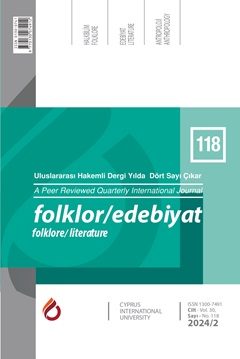Biyopolitikanın Tatar Edebiyatındaki Görünümü: Kolhoz ve Kamp
Reflection of Biopolitics in Tatar Literature: Kolkhoz and Camp
Author(s): Alp Eren DemirkayaSubject(s): Politics, Studies of Literature, Other Language Literature
Published by: Uluslararası Kıbrıs Üniversitesi
Keywords: Biopolitics; kolkhoz; camp; Tatar literature; Oblomov;
Summary/Abstract: This article constitutes a comparative analysis of Mirsey Emir’s novella “Agıydil” and Fevziye Beyremova’s novel “Kırık Sırt,” both recognized as seminal works within Tatar literature, composed in distinct historical periods. This analysis is conducted through the lens of the concept of biopolitics as articulated by Michel Foucault and subsequently nuanced by the critiques of Giorgio Agamben. In the context of Soviet Russia following the October Revolution of 1917, the establishment of kolkhozes emerged as a fundamental manifestation of the eradication of individual property rights and the transfer of land ownership to the state. However, this transition engendered discord between the government and affluent peasants in a relatively brief span. Designated as “kulaks” by the Soviet regime, these affluent peasants were forcibly relocated to various remote regions such as the Siberian and Kazakh steppes, the Solovetsky Islands, and the Magnitogorskiy camp-an emerging industrial enclave-due to their refusal to acquiesce to the kolkhoz system, resulting in their marginalization and demise. Meanwhile, peasants who, though unwillingly, recognized their dependency on the kolkhoz system were integrated into the state’s mobilization efforts, thereby negating their passive stance. Within the narrative framework of “Agıydil,” protagonists Ilyas and Gayaz ardently endeavor to rectify the operational deficiencies within the kolkhoz system in rural villages and motivate Komsomol members to actively participate in production. The juxtaposition of action and inaction among the characters is examined with reference to Ivan Goncharov’s novel “Oblomov.” Conversely, “Kırık Sırt” elucidates the tragic plight of Asılgerey and his family, designated as kulaks, who are exiled from their village to the camps in Magnitogorskiy. The narrative critically depicts the harsh living conditions within the camps, the objectification of the female body, the pervasive surveillance and control over the populace, and the toll of diseases, drawing upon the characters’ experiences. Such critiques underscore the biopolitical paradigms that prioritize the regulation and, ultimately, the mortality of the human body. The portrayal of kolkhozes and camps as tangible loci of governmental intervention with the body facilitates a biopolitical reading within Tatar literature.
Journal: Folklor/Edebiyat
- Issue Year: 30/2024
- Issue No: 118
- Page Range: 413-426
- Page Count: 14
- Language: Turkish

